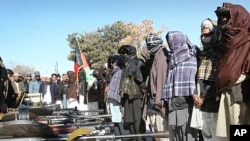News that the Afghan Taliban will be opening an office in the Gulf state of Qatar triggered speculation about possible talks for a political settlement in Afghanistan, but analysts caution against excessive optimism about any deal.
Announcement of the Qatar office came in a statement earlier this month from the Taliban group believed to be based in Quetta, Pakistan. Many of the insurgents who attack U.S. and allied forces in Afghanistan have safe havens in Pakistan.
Marvin Weinbaum of the Middle East Institute says the U.S. has been talking not only with the Taliban about opening a political office, but also has been prodding President Hamid Karzai to accept such a setup.
"I'm surprised it took so long," Weinbaum said. "This has been an American initiative."
The U.S. currently plans to pull its combat troops out of Afghanistan by 2014, assuming that Afghan military and police forces are able to assume security responsibilities. Analysts say the Qatar office will give the U.S. a channel to talk to Taliban leaders in a neutral area.
Karzai said he agreed to the Qatar arrangement, but would have preferred a Taliban office in Turkey or Saudi Arabia. There is considerable suspicion that the Taliban is not really interested in a political settlement that would lead to some kind of power-sharing arrangement, such as division of government ministries.
"Why on earth would they compromise when their end goal is a sharia [Islamic law] state?" Weinbaum said. "They're Pashtuns, sure, but they're Islamists first."
U.S. officials have repeatedly said any political settlement should be "Afghan-led." But the Taliban pointedly made no mention of the Kabul government when it announced the Qatar oiffice. It said the two "main parties" in the conflict are the Taliban and the U.S. and its allies. It also called for the release of several key Taliban leaders from the U.S. detention facility at Guantanamo Bay, Cuba.
The Taliban also made no mention of Pakistan, which sees itself as having a major interest in any political settlement in Afghanistan. Pakistan is an erstwhile ally of the U.S. in fighting extremism, but the U.S. has also accused Pakistan of supporting Taliban elements as a hedge against India's bid for political and economic influence in Afghanistan. The Washington-Islamabad relationship has deteriorated considerably in recent months.
Larry Goodson, a professor at the U.S. Army War College, said the Taliban considers the Karzai government illegitimate. He believes opening the liaison office is simply a bid by the Taliban to buy time until the U.S. and its allies leave Afghanistan.
"I think it's a gambit, if you will, by the Taliban, but also by their Pakistan supporters to prepare for the situation as the U.S. prepares to withdraw," he said. "I absolutely think they are trying to present themselves as independent from Pakistan. But having said that, I don't think they really are."
Goodson, who has long experience in Afghan-Pakistani affairs, also notes that Pakistan has supported one of the more lethal Taliban factions, the Haqqani network. He says it is possible Pakistan's intelligence service, the ISI, may play a double game, supporting one faction in negotiations while supporting the Haqqanis' military operations.
"[The Taliban] have us over a barrel because, regardless of any liaison office the Taliban seek, they still get rest and recuperation and resupply in Pakistan," Goodson said.
Some information for this report was provided by AP, AFP and Reuters.




